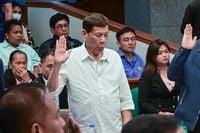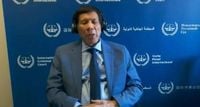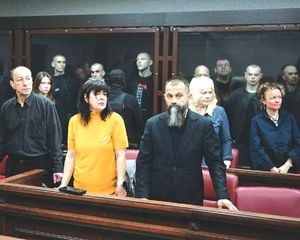The International Criminal Court (ICC) has thrust former Philippine President Rodrigo Duterte back into the global spotlight, ordering a comprehensive medical examination to determine if he is fit to stand trial on charges of crimes against humanity. The move, announced in a series of decisions released between October 16 and 18, 2025, marks a pivotal moment in the court’s ongoing probe into Duterte’s role in the deadly anti-drug campaign that defined his presidency and his earlier tenure as mayor of Davao City.
The ICC’s Pre-Trial Chamber I, presided over by Judge Iulia Antoanella Motoc and joined by Judges Reine Adélaïde Sophie Alapini-Gansou and María del Socorro Flores Liera, appointed a panel of three medical experts to assess Duterte’s condition. The panel, whose members’ names remain confidential in public documents, includes specialists in forensic psychiatry, neuropsychology, and geriatric or behavioral psychology. Their task: to determine whether the 80-year-old Duterte can meaningfully participate in the complex judicial proceedings ahead.
According to GMA Integrated News, the tribunal instructed the panel to submit their findings—either jointly or as individual reports—by October 31, 2025. All parties, including the defense, prosecution, and the Office of Public Counsel for Victims, have until November 5 to file their comments and observations. The ICC’s decision stresses that the ultimate question of fitness to stand trial is not merely a medical issue, but a legal one. As the court put it, “The Chamber emphasizes that the question of whether a suspect is fit to take part in the pre-trial proceedings is a question of law that falls exclusively within the remit of the Chamber’s legal determination.”
In practical terms, the experts are tasked with evaluating whether Duterte’s health—particularly any cognitive or psychological impairments—affects his ability to follow the proceedings, understand the charges and evidence, and instruct his lawyers. The court also asked for recommendations on any special measures or adjustments that might be needed to accommodate Duterte’s condition during the trial process.
This latest development comes in response to a motion filed by Duterte’s defense team, led by attorney Nicholas Kaufman, on August 18, 2025. Kaufman argued for an indefinite postponement of the court proceedings, claiming that Duterte was “unfit for trial.” According to court documents cited by ABS-CBN and Philippine Daily Inquirer, Kaufman described his client as unable to recall events, places, or even close family members. He further contended that Duterte “lacked the cognitive ability to understand his detention or to properly conduct his defense.” In a public redacted version of the defense’s request released on September 11, Kaufman asserted, “He is not even able to process the reasons for his detention.”
The ICC responded to these concerns by postponing the confirmation of charges hearing, which had originally been scheduled for September 23, 2025. The court made it clear, however, that the mere presence of a medical condition does not automatically disqualify a defendant from standing trial. Instead, the focus remains firmly on whether Duterte can effectively exercise his procedural rights.
The court’s order for a medical examination was issued under Rules 113 and 135 of the ICC’s Rules of Procedure and Evidence. The panel’s mandate includes assessing “the extent to which [Duterte] is able to understand the charges, the evidence and the conduct, purpose and possible consequences of the pre-trial proceedings, and instruct Counsel for the preparation and conduct of his defense,” as reported by Philippine Daily Inquirer. The ICC Registry was also directed to submit a shortlist of qualified medical experts before the panel was formally appointed.
Despite the defense’s arguments, the ICC has shown little inclination to release Duterte from detention. On September 26, 2025, the court denied a request for interim release, ruling that his continued detention “remains necessary under Article 60(2) of the Statute,” as outlined by ABS-CBN. The decision referenced not only the legal requirements for detention but also Duterte’s objections to his arrest, his family’s appeals for his repatriation to the Philippines, and public remarks from his daughter, Vice President Sara Duterte, who had previously declared she would “break her father out” of ICC custody.
According to GMA Integrated News, the court’s decision to keep Duterte in custody reflects the seriousness with which the ICC is treating the charges. The crimes against humanity charges stem from thousands of deaths linked to Duterte’s war on drugs, a campaign that drew sharp criticism from human rights groups and international observers. The ICC’s investigation covers not only Duterte’s presidency but also his earlier years as mayor of Davao City, when similar tactics were allegedly employed.
The legal wrangling over Duterte’s fitness to stand trial has added a new layer of complexity to an already fraught process. While Duterte’s defense team insists that his cognitive decline renders him incapable of participating in his defense, victims’ families and their advocates continue to press for accountability. The Office of Public Counsel for Victims, representing those affected by the anti-drug campaign, has been granted the opportunity to respond to the medical panel’s findings, ensuring that the voices of victims remain part of the proceedings.
The ICC’s approach underscores the delicate balance between safeguarding the rights of the accused and upholding the demands of justice for victims. By appointing a multidisciplinary panel of experts, the court aims to ensure that its eventual decision on Duterte’s fitness is informed by the best available medical and legal analysis. The emphasis on the accused’s ability to participate, rather than the mere presence of illness, aligns with international legal standards and seeks to prevent the abuse of health claims as a tactic to evade justice.
Yet, the road ahead is anything but straightforward. Even if the panel finds Duterte unfit for trial, his lawyer has stated that the former president will remain in ICC custody, according to ABS-CBN. This raises thorny questions about the fate of high-profile detainees whose health may deteriorate during lengthy international legal proceedings. Meanwhile, the broader political context in the Philippines remains tense, with Duterte’s supporters and critics alike watching closely as the case unfolds.
As the October 31 deadline for the panel’s report approaches, all eyes are on the ICC. The outcome of the medical examination could determine not only Duterte’s immediate future but also set a precedent for how international courts handle cases involving elderly or ailing defendants accused of grave crimes. For now, the world waits as legal, medical, and moral issues converge in The Hague, where the quest for justice and the rights of the accused hang in a delicate balance.
With the ICC’s careful steps and the international community’s attention fixed on the proceedings, the next chapter in the Duterte saga is set to unfold with high stakes for both accountability and due process.





